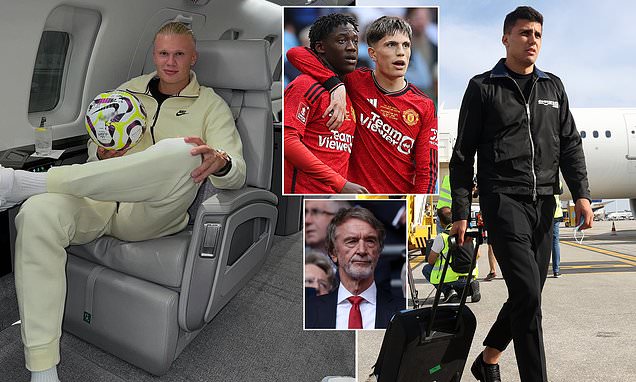
In a surprising twist of events, Manchester United recently made headlines not just for their performance on the pitch, but for a bold request directed at their local rivals, Manchester City. As the Ballon d’Or ceremony approaches, reports emerged that United sought assistance from City, asking them to provide a lift to the prestigious event aboard their private jet. The request, however, was met with a swift and definitive rejection from City, igniting a firestorm of controversy and debate across the football community.
The Background of the Request
As the financial landscape of football continues to evolve, many clubs are grappling with the impacts of rising costs and diminishing revenues. Manchester United, historically one of the richest clubs in the world, has found itself in a precarious position, facing scrutiny over its expenditures and the effectiveness of its management. Recent seasons have been marred by inconsistent performances, leading to a significant drop in revenues and a re-evaluation of their financial strategy.
In an apparent attempt to save costs related to travel for the upcoming Ballon d’Or ceremony, United’s management reached out to their neighbors at Manchester City. The suggestion was simple: would City be willing to transport some of United’s players on their private jet to the event? This audacious proposal not only highlights United’s current financial woes but also underscores the complicated relationship between the two clubs, which has become increasingly competitive and antagonistic over recent years.
City’s Response: A Refusal That Resonates
City’s rejection of United’s request was swift and clear. While the details of the conversation remain somewhat murky, insiders suggest that City viewed the request as not only inappropriate but also a violation of the competitive spirit that characterizes their rivalry. For many fans and pundits alike, this refusal represents a stark reminder of the disparity in club cultures and the contrasting approaches to success between the two Manchester giants.
The rejection has sparked a heated debate among supporters and analysts. On one hand, City’s decision to decline the request may be seen as a show of strength and independence, reinforcing their commitment to maintaining a competitive edge. On the other hand, it exposes the vulnerabilities of United, a club that has struggled to maintain its status in the modern footballing era.
The Broader Implications
The incident raises critical questions about the financial health of major football clubs in England and the lengths to which they might go to manage their costs. As the industry grapples with issues such as COVID-19-related revenue losses and escalating player wages, teams are being forced to reconsider traditional practices and rivalries.
United’s move to ask for assistance from City can be interpreted as a desperate measure from a club attempting to regain its former glory. It highlights the challenges faced by one of the most storied teams in football, now overshadowed by their rivals’ recent successes. For many, this scenario serves as a cautionary tale of how quickly fortunes can change in football.
Fan Reactions: A Mixed Bag
Responses from fans have been decidedly mixed. Some Manchester United supporters express embarrassment over the club’s request, viewing it as a sign of desperation that undermines their pride and heritage. Others, however, see it as a pragmatic approach to a difficult situation, arguing that any help in the pursuit of individual accolades should be welcomed.
Conversely, Manchester City fans have responded with a mixture of humor and disdain. Many have taken to social media to mock United’s request, with some claiming it reflects a deeper decline in their neighbor’s fortunes. The incident has only intensified the longstanding rivalry, as both sets of supporters take to their respective platforms to voice their opinions.
Conclusion: A Turning Point for United?
As Manchester United navigates this turbulent period, the request for assistance from Manchester City may be seen as a pivotal moment in their ongoing struggle for supremacy in English football. The rejection from City serves not only as a reminder of the current state of affairs but also as a wake-up call for United to reassess its strategy both on and off the field.
Ultimately, this incident is more than just a request for a lift; it encapsulates the broader narrative of two clubs on diverging paths. With the Ballon d’Or ceremony on the horizon, it remains to be seen how Manchester United will approach the event and whether they can rise above the controversies that have recently plagued them. As fans and pundits alike keep a close watch, one thing is clear: the battle for supremacy in Manchester is far from over.




